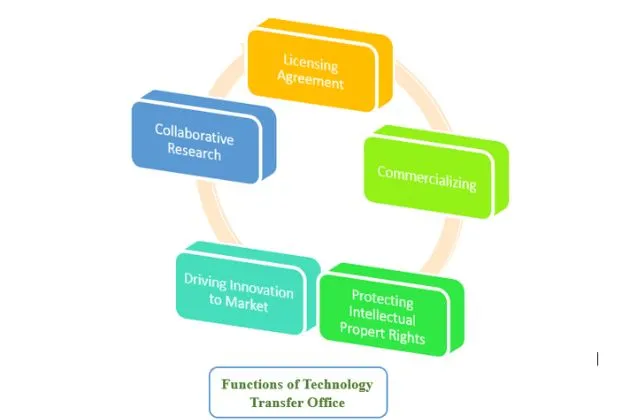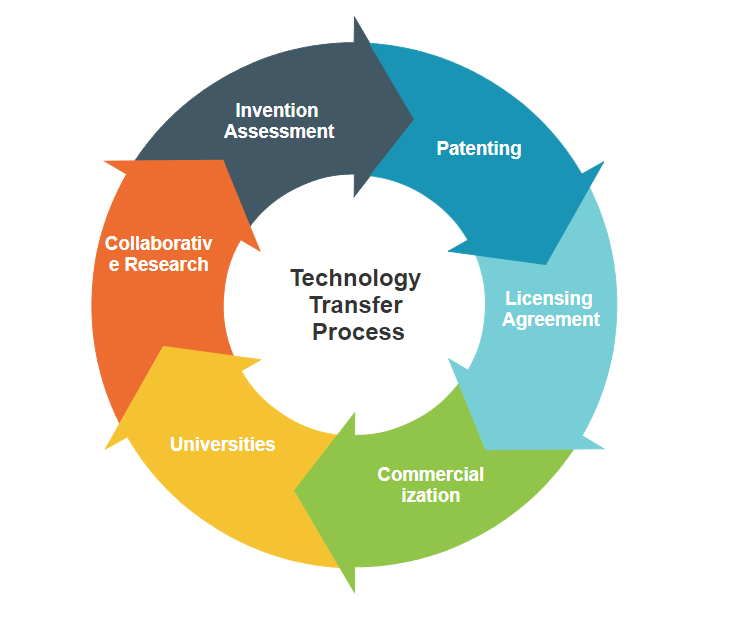Collaborative research enables experts to pool their expertise and intellect to draw innovative outcomes that surpass individual achievements. This research type has become the bedrock for driving commercial innovation. Commercial innovation increasingly depends on collaborative research partnerships between researchers, entrepreneurs, and industry experts. These partnerships foster an essential connection to bring inventions and technological developments to the market. This is where the Technology Transfer Office or TTO comes into play.
Technology Transfer Office (TTO) acts as an important resource for researchers who are willing to commercialize their research inventions. It acts as a bridge between researchers and industry experts by facilitating the translation of academic research into tangible outcomes.
What is Technology Transfer Office (TTO)?
A technology transfer office (TTO) is an intermediary body within a university, educational or research institution, or other organizations that is responsible for managing its intellectual property (IP) assets acquired through various R&D initiatives and the transfer of knowledge and technology to commercial sectors.
Typically, TTOs facilitate intellectual property rights management and dissemination of knowledge and technology to other industries to bridge the gap between academia and industry. TTOs are established by developing connections with academic centers to translate knowledge into products or services. TTOs have crucial roles in the acquisition of technology-transfer knowledge by professionals. TTOs play a significant part in collaborative research by overseeing the management of the IP holdings, negotiating licensing agreements and commercializing research products.
The Roles of Technology Transfer Offices with Respect to Collaborative Research
The fundamental goal of Technology transfer offices is to link research with real-world services or products to find problem solutions, offering societal benefits and gaining profits. It serves as a domain expert, functional expert, or field expert for researchers to establish relationships with marketers. TTOs provide crucial framework and support for collaboration and mediate relationships between research and industry by encouraging entrepreneurship and commercialization. They make sure innovations that are made by researchers are successfully applied, modified, and incorporated in commercial applications to bring those innovations to the marketplace.
The main roles of Technology Transfer Offices with respect to collaborative research are as follows:

1) Intellectual Property Management
Technology Transfer Office is responsible for systematic management of intellectual property that are obtained from research and development initiatives. These offices are created within a university or research institution to manage its IP (intellectual property) assets. This is done for the purpose of transferring knowledge and integrating technology into an industry. They work with researchers to identify IP that has the potential for commercialization and protects it against infringements through patents, copyrights, and other forms of intellectual property protection.
2) Negotiating Licensing Agreements
Another important role of Technology Transfer Office is to negotiate agreements between research institutes and industry partners who are interested in using the intellectual property developed by the researchers. While negotiating, TTOs often consider elements like- license type, first offer, exit strategies, payment postponing, and others. This agreement allows industry partners to obtain the permission of using the IP for a specific purpose under specific conditions, making sure the interests of both the parties are brought into consideration.
3) Commercialization of Research Results
TTOs foster partnerships between researchers, stockholders, industry experts and business leaders across industries to bring ideas and inventions together on a single forum to look for commercial opportunities and commercialize research results. Through invention disclosure in the technology transfer process, inventors evaluate their inventions to find out commercialization options by describing the entire invention. Promoting commercialization of ideas and technology is the key function of TTOs.
How does it help Researchers?
Technology Transfer Office helps researchers in many ways.
Commercializing University Research: In the last 30 years, the majority of US universities have established TTOs to aid the commercialization of university research. TTOs have varied roles to play during the patenting, licensing, and spinoff process of the invention depending on the nature of complexities associated with this practice. In this process, TTOs contributed to licensing, legal affairs, patenting, fostering collaboration between researchers and licensing companies, and business creation.
Addressing Patenting Issues: TTOs work with researchers and assist them in protecting their intellectual property against infringements through registering patents, copyrights, and other IP protection initiatives.
Executing Assessments of Inventions: TTOs help researchers by assessing the commercial potential, novelty, and salability of the invented product or services. TTOs conduct interviews with researchers or inventors and evaluate the market and technology to measure the adaptability of the invention for commercialization.
Conclusion
Starting from safeguarding IP, and negotiating licensing agreements to commercializing research works or inventions, Technology Transfer Offices have diverse roles to play in collaborative research. TTOs play a crucial part in technology transfer practice by identifying, managing, and protecting the intellectual property rights driven by collaborative research.











